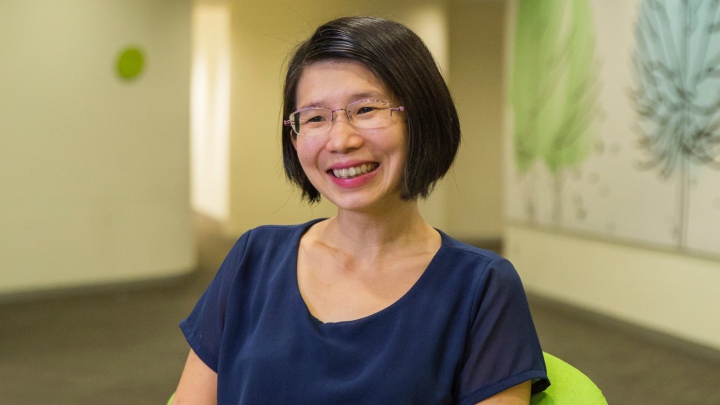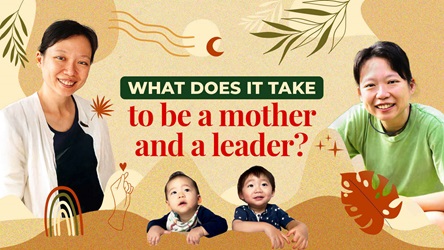Walking The Ground For Better Policies

In her role as Deputy Secretary, Ms Teoh Zsin Woon is often jokingly chided by her colleagues to “stop running around in the heartlands”, “behave” and do “serious” Deputy Secretary work.
Ms Teoh is just as likely to spend a whole day at a social service centre as she does in back-to-back meetings at the office. On top of that, she volunteers as a Befriender to the elderly.
But she sees her activities meeting people not as “extra-curricular” work, but as an integral part of her job. CEOs, she points out, devote a lot of time to understanding their customers. “That is core to their job. Why should that be different for public service?”
Ms Teoh believes engagement is her main job – this sense of connection to needs on the ground is central to crafting citizen-centric policies. Finding out what is wrong is particularly important, she emphasises. “Only when you find out what's wrong, then you will improve.”
Engaging for better understanding
It is what motivates her to continue in her community work. Going into every interaction with a clear policy question in mind, she also puts herself in the shoes of others.
After all, there is nothing quite like seeing how policies and programmes really affect people. “This one-on-one deep engagement with citizens, and going through the whole process myself, gives me great insights into what more we can do better.”
It is an approach Ms Teoh brings with her from her volunteering and her previous role as Deputy Secretary (Development) at Ministry of Health, where she oversaw the Ageing Planning Office, the Manpower Planning & Strategy Division, and the Infrastructure Planning & Policy Division.

Ms Teoh spends time with an elderly woman in her 90s who lives alone. The senior citizen is frail and at high risk of falls. If viewed simply as a hospital patient, perhaps one would assume that a nursing home would be the best place for her.
“But as a Befriender, seeing her in her home, we know that she does not want to go to a nursing home. She wants to live at home and tend to her plants,” says Ms Teoh.
This understanding gave healthcare and community care providers better insight in redesigning services so that the senior citizen could age-in-place at home. Today, Befrienders take turns to check on the elderly woman, ensuring that she wears her alert alarm and has taken her medication.
Encounters like this, says Ms Teoh, illustrate how the citizens and their experiences can be some of the greatest teaching moments.
Finding the deeper meaning
Face-to-face interactions also reconnect public officers to a sense of purpose and reinforce the reason people join the Public Service. Ms Teoh wants this to be a key driver for the Public Service as it transforms.
She says: “I hope the public sector will become like a 145,000-strong startup, where every one of the 145,000 officers are entrepreneurs in their own right, deeply driven by a passion for serving our citizens.”
Ms Teoh points to upcoming programmes aimed at building this emotional connection and a better understanding of citizens as customers. One is a prototype immersion programme for directors. “They talk to citizens and observe how our frontline officers interact with them. These give the directors a better understanding of the citizens we serve.”
Another programme is a service-wide volunteering movement called Public Service Cares. This initiative encourages public officers to contribute to a cause they care about. The goal is to use this as an opportunity for public officers to have a better, more intimate emotional connection with citizens, and better appreciate the realities on the ground.
It is this connection to a purpose that will buoy officers in times of difficulty and frustration, adds Ms Teoh, noting that one cannot always find clear-cut solutions in today’s uncertain and volatile world. But constantly re-engaging with the citizens and knowing their needs, wishes and aspirations will provide “the anchor point” for public officers and guide them in their work.
Also supporting officers is a new online learning platform to nurture their creativity and impart the skills needed to drive these changes.
Do, adjust, and keep doing
The ideas and insights gathered must do more than build a picture of what is needed – they have to form the foundation in getting things done. Ms Teoh reflects on three important lessons from her experience in the Public Service so far.
Talk less, do more.
“There is only so much you can think about solutions. You need to start by doing,” she says. Rather than wait for all the answers, arm yourself with the fundamentals and take the first step to prototype ideas.
Do first, adjust later.
“Let's just start first and then try to adjust on the go. In this world, a lot of how you find your way across the river is really by feeling the stones.” Do not be afraid to grapple with complexity and have the fortitude to get one’s hands dirty.
Ms Teoh recalls a veteran grassroots leader in Whampoa who shared how in Singapore’s early days of nation building, the whole community – villagers, grassroots leaders, gangsters and all – would band together during heavy rains to fight the inevitable floods.
“I'm quite inspired by [what] you may want to call this ‘old style’ leadership, where we work together as one team to confront the messiness and the challenges together.”
Persevere.
“Never say die, because with the challenge of complexity, difficulty is a certainty. So, as long as you roughly know where you're headed, start doing!”

What’s in your cuppa?
Kopi O kosong or dispenser coffee in the office
How often do you have it?
Too many times a day, on the go. I sustain my life with this.
- POSTED ON
Feb 26, 2019
- TEXT BY
Sheralyn Tay
- PHOTOS BY
Norman Ng









